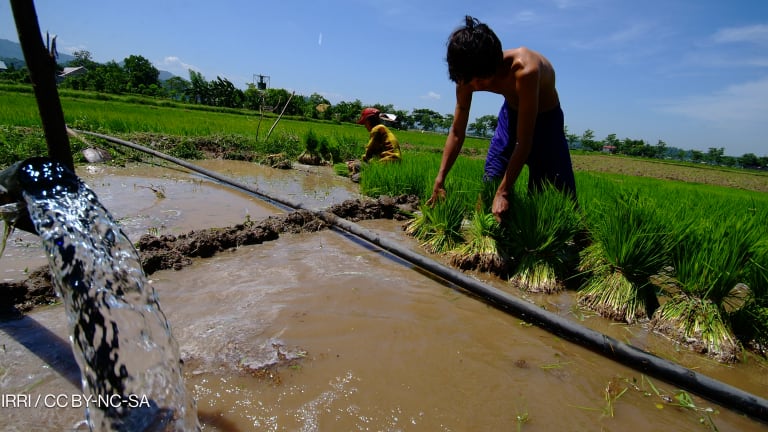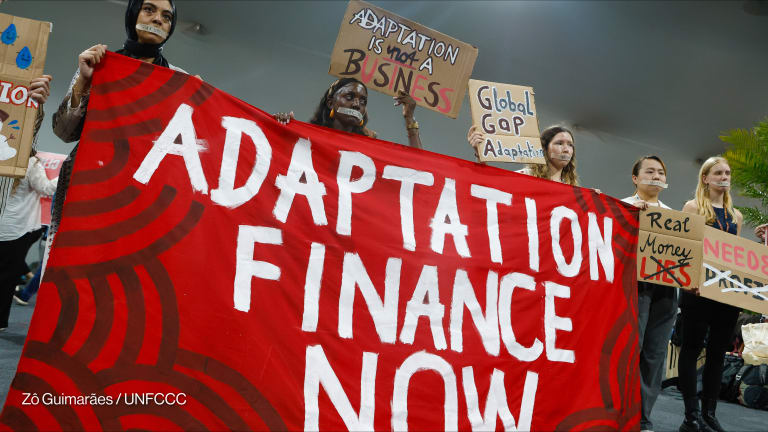
LONDON — A new high-level expert group plans to develop proposals to unlock more climate finance, specifically for improved water services in low- and middle-income countries, before the 2020 United Nations Climate Change Conference, or COP 26.
“A lot of the challenges and barriers ... relate to the fact that many countries do not have the capacity to access the money in the first place.”
— Chilufya Chileshe, regional advocacy manager for southern Africa, WaterAidThe group was announced at WaterAid’s Water and Climate Summit, convened this week in London, after a roundtable discussion hosted by WaterAid’s president, Prince Charles, who has been holding a series of climate-focused conversations. Speaking at the summit, he highlighted the need for an integrated approach to water and the climate crisis.
Charles said protecting water is critical to survival and, during the roundtable, called for the same level of response around the new coronavirus for climate change. “I hope you can raise your level of ambition, collaborate for solutions at scale, and act — if I may say so — now,” he concluded at the summit.
The group’s launch follows WaterAid’s call for a tenfold increase in climate finance for improved access to water after a report revealed that countries with the lowest levels of water access receive as little as 17 cents per person per year for such needs.
Yvonne Aki-Sawyerr, mayor of Freetown in Sierra Leone, noted how water and climate change are intertwined. “There’s no pulling the two apart. We have got to keep the two together in the way we think about it and the way we respond to this crisis.”
Currently, 2.2 billion people worldwide don’t have access to a reliable and safe water service. The escalating number of droughts, flooding, and rising sea levels could see that figure increase, yet only 5% of climate finance is spent on adapting water services to safeguard against such incidents, according to the Climate Policy Initiative.
While there are many small projects already providing solutions to this issue, Charles said they often lack scale and investment.
One of the goals of the group — which is made up of private sector organizations and governments — is to create a pipeline of funding for LMICs, said Chilufya Chileshe, regional advocacy manager for southern Africa at WaterAid. Logistical details are still being finalized, but the group will seek to strengthen in-country resources so that LMICs are able to apply for funding and go on to deliver effective climate and water adaptation programs, she said.
“A lot of the challenges and barriers to accessing climate finance for the water sector relate to the fact that many countries do not have the capacity to access the money in the first place. … It costs a lot of money to put together a concept note,” Chileshe said. “The idea of the working group is to look into those barriers and propose ways of resolving them but also challenge existing funds and make recommendations to how existing funds can better address those barriers.”
Aki-Sawyerr said that while she has some staff members dedicated to tackling climate change, it’s never enough. Cities such as Freetown will benefit from the working group's ability to turn ideas into “effective movement,” particularly in terms of making financing available and improving the capability to design sustainable projects, she said.
Members of the group include Deloitte, Unilever, Prince Albert II of Monaco Foundation, UNICEF, Water.org, United Nations Sustainable Development Solutions Network, World Resources Institute, International Water Association, CCm Technologies, economist Nicholas Stern, and the governments of Burkina Faso, Nigeria, the Netherlands, and the U.K.
“It is meant to be a global working group that will bring in diversity of expertise from across the planet but also across the various interlinked sectors with water and climate,” Chileshe said, adding that while various facilities exist to provide climate finance, there is no time-bound group with a focus on financing for projects around water and climate adaptation.
Neil Dhot, executive director of AquaFed — an advocacy group aimed at connecting organizations with private water and wastewater service providers — said much work has already been done on how to increase financing in water and other sectors’ adaptation to climate change. He said he hopes the group will draw on that work and improve coordination between partners to deliver climate-resilient water and sanitation services.
“We would prefer to see all international efforts right now focused on supporting on-the-ground delivery using the expertise, data, and information that already exists,’ he said.
According to Chileshe, Charles challenged the working group to provide feedback on its progress as soon as June’s Commonwealth Heads of Government Meeting and then again in November at COP 26, where the group aims to conclude its work. “He went as far as saying that he would like to see 2020 be the ‘super year’ in which the climate crisis is resolved,” Chileshe said.
“On a more macro and long-term level, we need to be investing in more dams [and] water storage facilities so that we are able to survive irregular water patterns and provide water to areas that don't have access to tributaries from the Indus River,” said Omar Ilyas, who is co-founder and co-director of Paani, a nonprofit working in Pakistan to improve clean water access. “We also need to move away from such a water-intensive agricultural economy where we waste most of our water.”
Search for articles
Most Read
- 1
- 2
- 3
- 4
- 5








